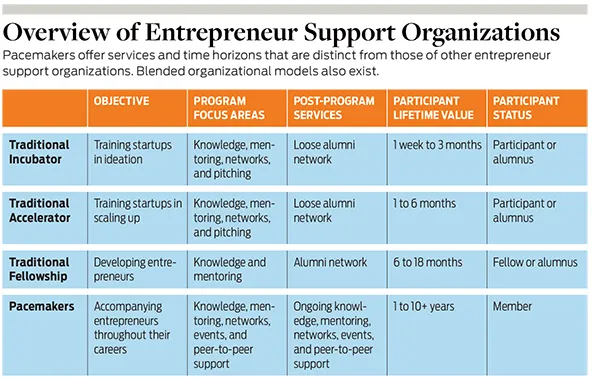Pacing Entrepreneurs to Success
Entrepreneurial support organizations called pacers are helping businesses in emerging markets achieve their goals by providing services for them in the long run.
June 08, 2022

In the Stanford Social Innovation Review, Sonali V. Rammohan, Darius Teter, and Jesper B. Sørensen of Stanford Seed and Tim Weiss of Imperial College write about how support organizations can meet the changing needs of entrepreneurs as they grow.
Small- and medium-sized enterprises (SMEs) create and sustain a substantial portion of jobs in emerging economies, contribute to innovation, and drive social impact, they write. Entrepreneur support organizations such as incubators, accelerators, and fellowship programs play an important role for SMEs in emerging economies by closing entrepreneurs’ gaps in knowledge, capital, and networks; providing guidance to reach targets; and fostering entrepreneurship ecosystems.
Research has shown the positive effects of entrepreneurial support on revenue growth, employment, and financing. However, upon completion of these programs, entrepreneurs are often back on their own, unless they participate in another support program. While entrepreneurs in industrialized economies have access to a broad range of professional services—industry trade associations, peer networking organizations, and consultants—that can help them navigate their growth over time, the fact that such services are less accessible in emerging economies results in a services gap.

In reviewing the field of entrepreneur support organizations across Africa and India, the authors identified more than 90 of the most visible accelerators, incubators, and fellowships. Typically, these organizations provide structured learning experiences, peer-to-peer interaction, mentoring, and access to investor networks over a discrete time period. Sixty organizations publicly shared details about their programs online. They found that 46 provide short-term, episodic services to entrepreneurs that last from a few days to six months, followed at times by a loosely organized alumni network. Recent data from the Global Accelerator Learning Initiative, a partnership between the Aspen Network of Development Entrepreneurs and Emory University, further undergird their findings on the gap in continued support for emerging-market entrepreneurs, showing that long-term services often don’t exist to support their growth but are direly needed.
Read the full article here.
This article appeared in the Summer 2022 issue of Stanford Social Innovation Review.


